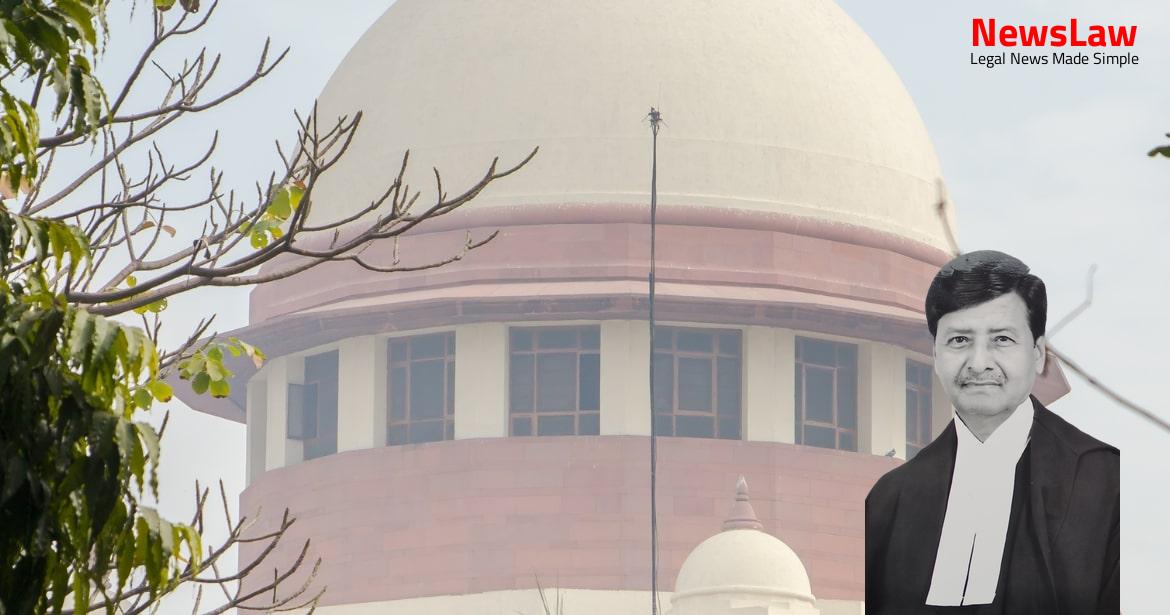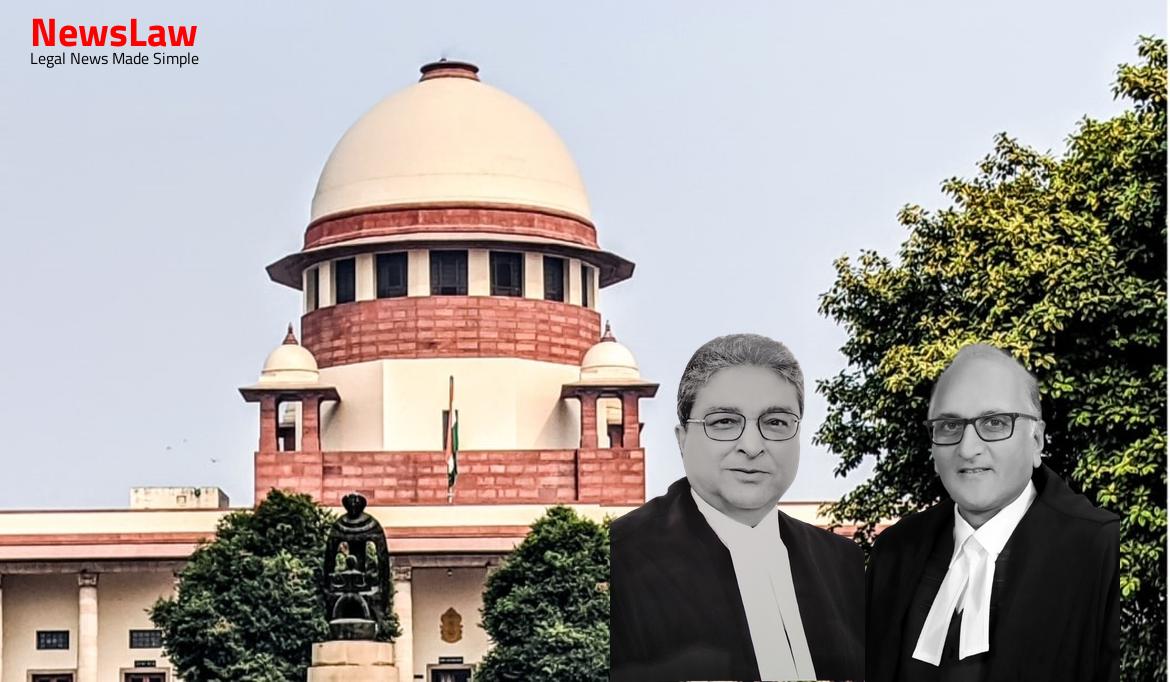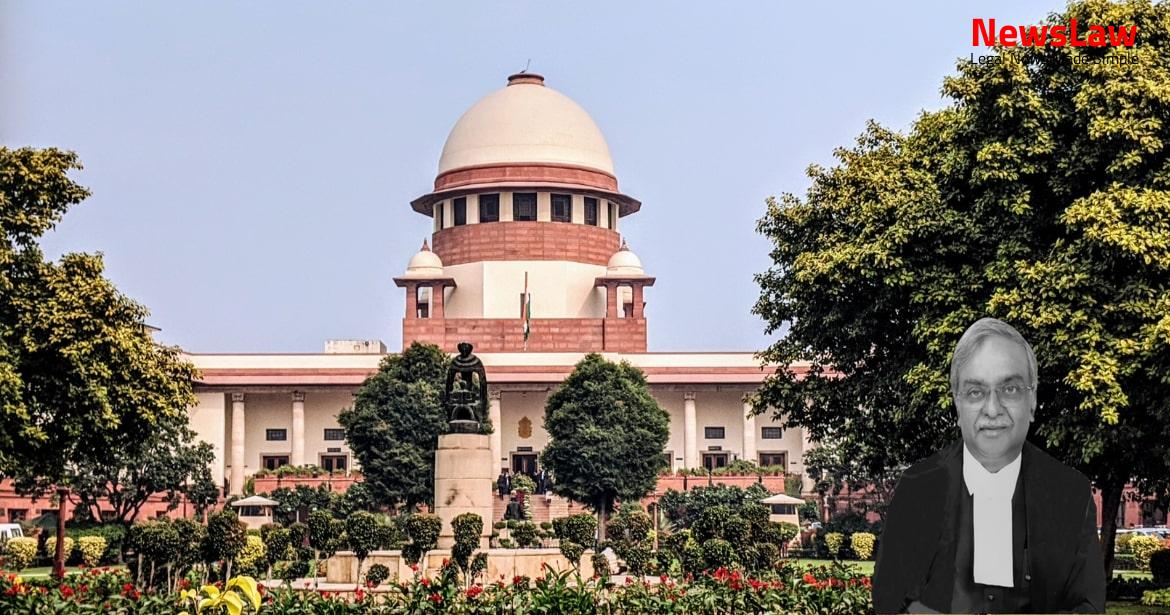In a recent legal case, the court’s meticulous legal analysis uncovered the unjust transfer of an employee due to reporting irregularities. The court’s in-depth examination sheds light on the legal principles surrounding transfer orders and workplace discrimination. Stay tuned to understand the significance of the court’s judgment. #legalanalysis #workplacediscrimination #justiceprevails
Facts
- Respondent transferred to a rural branch in Jabalpur from Indore despite being a Scale IV officer
- Respondent detected irregularities with liquor contractors’ accounts at the branch and was pressured to cover them up instead of rectifying
- Allegations against Zonal Manager for pressurizing and discussing non-urgent business late at night
- The respondent filed a Special Leave Petition under Article 136 of the Constitution
- Allegations against the Zonal Manager who has been promoted to Deputy General Manager and is now in New Delhi
- Transfer order stayed by a learned Single Judge during proceedings
- The respondent had drawn several irregularities to the notice of higher authorities and the transfer was mala fide.
- No reply was filed by the fourth respondent to counter the allegations made by the original petitioner.
- During the proceedings before the Division Bench, an offer was made to transfer the respondent to a Scale IV branch in Jabalpur, Jaipur, or New Delhi.
- The respondent had made serious allegations against the Zonal Manager which were brought to the attention of the bank’s Executive Director.
- The High Court found that the transfer of the respondent violated bank circulars and Ministry of Finance guidelines.
- The High Court’s judgment to quash the transfer order was affirmed by the Division Bench.
Also Read: Court’s Jurisdiction in Re-appraising Arbitrator’s Findings
Issue
- The Court needs to enquire into whether the order of the High Court quashing the order of transfer can be sustained.
- This enquiry should consider the principles of law relating to transfer orders.
Also Read: Contrary Directions in Issuance of Letter of Intent
Arguments
- The Petitioner’s argument is based on the findings of the Internal Complaints Committee of the bank which concluded that the allegations against the Respondent had no substance.
- The Petitioner states that a vigilance and special audit were conducted by the bank upon receiving the complaint from the Respondent.
- The principle of restraint in matters of judicial review is emphasized citing relevant court decisions such as Bank of India v Jagjit Singh Mehta, State of UP v Gobardhan Lal, and Rajendra Singh v State of UP.
- It is highlighted that the Petitioner claims the Respondent’s transfer was necessary due to the stringent measures suggested by her, following which she was transferred from Indore to Sarsawa, with the option of being posted in Bhopal.
- The Petitioner argues that the original transfer order was modified to accommodate the Respondent’s preferences.
- The grievance is raised by the Respondent regarding bias in the Internal Complaints Committee and the absence of an independent member as required by law.
- The Petitioner contests the alleged malafides in the transfer, stating that the decision was made based on recommendations from General Manager-level officers rather than the Zonal Manager accused of corruption.
- It is noted that the Respondent moved a complaint for sexual harassment under the Sexual Harassment of Women at Workplace Act, and the Local Complaints Committee found the charge to be true.
- The Petitioner argues that important documents have been withheld by the Respondent, including reports from the Local Complaints Committee and the presence of an independent member from the Panel Counsel.
- The respondent, a Scale IV officer, was transferred to a Scale I level bank branch despite a Board Resolution approving a policy on branch classification
- The branch to which the respondent was transferred is a rural branch where Scale I officers are typically posted
- The respondent was previously working as a Chief Manager in an exceptionally large branch in Indore
- The respondent is pursuing legal action to defend her position as a matter of principle
Also Read: Application for Stay in Civil Suit Rejected: Court’s Legal Analysis
Analysis
- The respondent raised objections to the presence of certain members of the Committee due to lack of independence.
- The respondent had pointed out serious irregularities and corruption in the maintenance of accounts of liquor contractors.
- She was victimized for reporting irregularities and was unjustly transferred to a lower position branch.
- Allegations of sexual harassment were later raised against the Zonal Manager.
- The constitution of the ICC by the bank had fundamental defects, including the presence of biased members.
- Transfer orders can be challenged if shown to be malafide or contrary to statutory provisions.
- The High Court rightfully intervened to review the unjust transfer of the respondent.
- Transfer being an exigency of service, employee choice in postings is limited.
- There was a need for a truly independent third party in the ICC as per provisions of the Act.
- The jurisdiction of the LCC under Section 6 can be invoked in specific situations.
- Section 4(2)(c) of the Act specifies that one member of the ICC must be from a non-governmental organization or association dedicated to women’s causes or someone knowledgeable about sexual harassment issues.
- Sexual harassment at the workplace violates a woman’s fundamental rights to equality, dignity, and the ability to practice her profession, as outlined in the Constitution.
- Section 3 of the Act outlines certain provisions.
- Section 4 of the Act mandates the formation of an ICC in all administrative units or offices of the workplace.
- The respondent was not assigned an office at Indore despite the order of stay.
- The respondent was asked to sit away from the place assigned to a Branch Manager, causing indignity.
- The Court needs to issue a direction to address the unfair treatment faced by the woman employee.
- The direction should serve the interest of the bank while preserving the dignity of the woman employee.
Decision
- Respondent entitled to costs of Rs 50,000 to be paid within one month
- Competent authority of the bank can decide on her place of posting after one year
- Decision of the High Court is affirmed
- Respondent officer to be reposted at Indore branch as Scale IV officer for one year
Case Title: PUNJAB AND SIND BANK Vs. DURGESH KUWAR (2020 INSC 225)
Case Number: C.A. No.-001809-001809 / 2020



